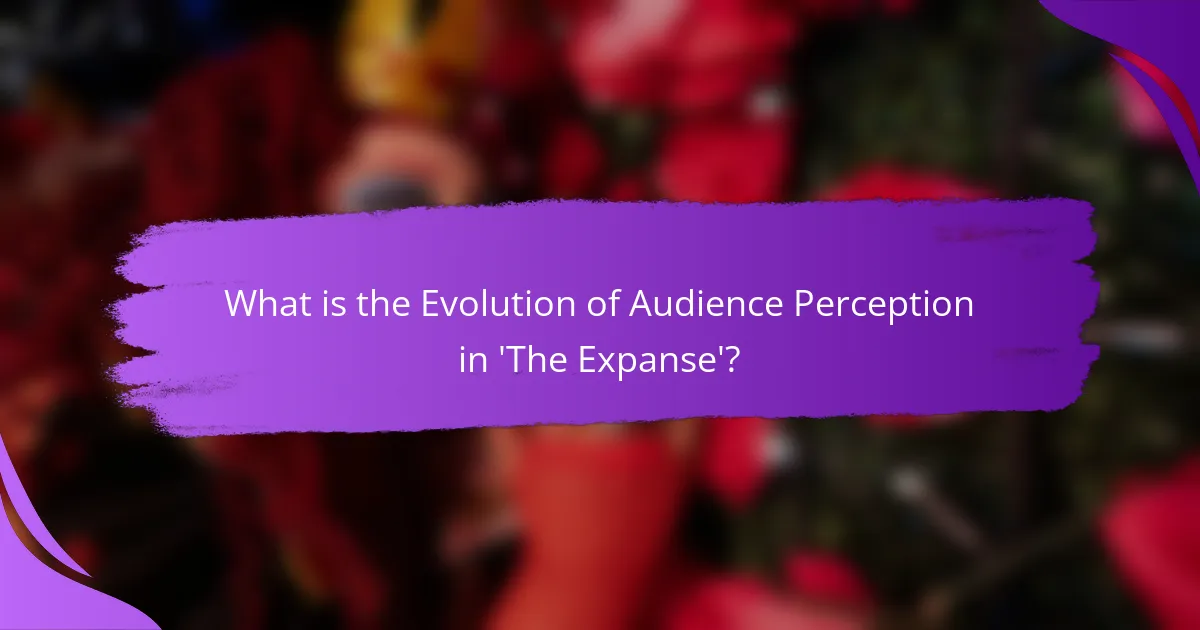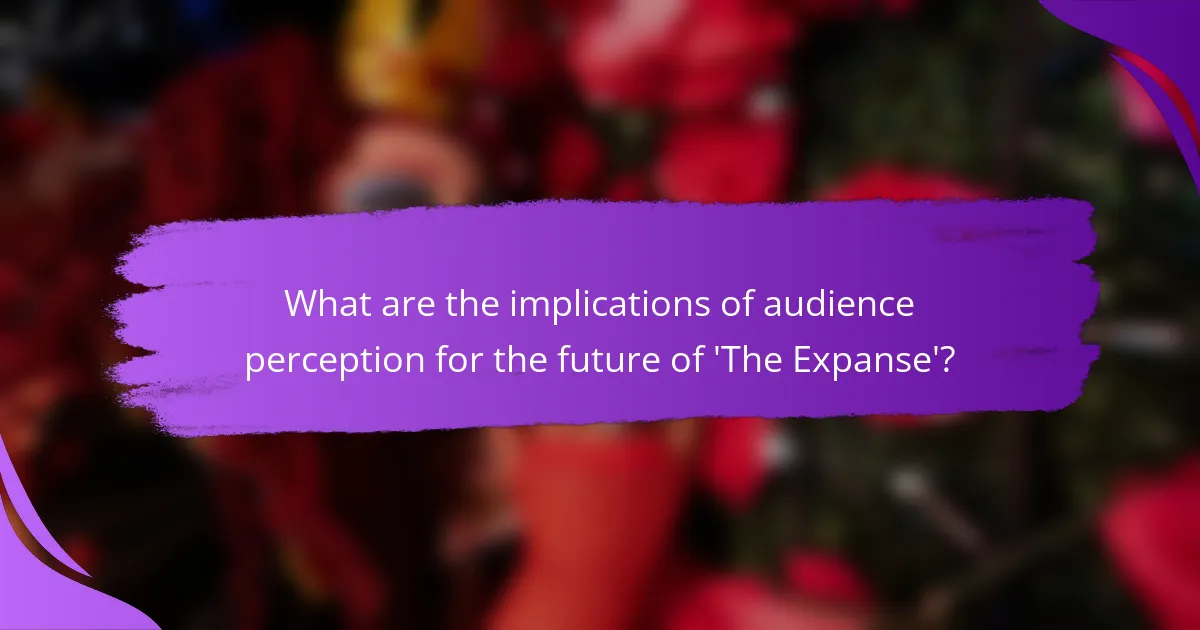The article examines the evolution of audience perception of the science fiction series ‘The Expanse’ over its seasons. Initially characterized by skepticism due to its complex narrative, the series gained appreciation for its character development, social justice themes, and realistic portrayal of science and technology. As audience engagement increased, so did viewer ratings and critical acclaim, leading to a dedicated fanbase actively discussing the show on social media. The article highlights key milestones in audience perception, including the transition from niche interest to a beloved series, and discusses the implications of viewer reception on the show’s future, including potential investments and narrative direction.

What is the Evolution of Audience Perception in ‘The Expanse’?
The evolution of audience perception in ‘The Expanse’ has shifted significantly over its seasons. Initially, viewers were drawn to its complex world-building and political intrigue. As the series progressed, audience appreciation grew for its character development and themes of social justice. The show’s depiction of realistic science and technology also garnered positive responses. Critically, the later seasons received higher ratings, indicating increased viewer engagement. Audience discussions on social media became more frequent, reflecting a dedicated fanbase. Overall, ‘The Expanse’ evolved from a niche sci-fi series to a beloved staple in the genre.
How has audience perception changed throughout the seasons of ‘The Expanse’?
Audience perception of ‘The Expanse’ has evolved positively over its seasons. Initially, the show garnered a mixed response. Viewers appreciated the world-building but criticized pacing in early episodes. As the series progressed, storytelling improved significantly. Season three marked a turning point with heightened tension and character development. Audience ratings increased, reflecting greater engagement. By the final season, ‘The Expanse’ received critical acclaim. It was praised for its ambitious narrative and complex themes. The overall shift shows a growing appreciation for the show’s depth and production quality.
What factors contribute to shifts in audience perception over time?
Shifts in audience perception over time are influenced by several key factors. These factors include narrative development, character arcs, and thematic evolution. As ‘The Expanse’ progresses, the storyline deepens, leading to changing audience interpretations. Character growth and complexity can alter viewers’ emotional connections. Audience engagement with social and political themes can shift perceptions based on real-world events. Viewer feedback and social media discussions also play a significant role in shaping opinions. Critical reviews and ratings can further influence audience perspectives. Ultimately, these elements combine to create a dynamic perception landscape throughout the series.
How do character developments influence audience views?
Character developments significantly influence audience views by shaping emotional connections and perceptions of morality. As characters evolve, viewers often reassess their initial judgments. For instance, a character who starts as an antagonist may reveal deeper motivations, prompting empathy. This transformation can lead audiences to support previously disliked characters. In “The Expanse,” characters like Amos Burton exhibit complex growth, altering audience perceptions of justice and loyalty. Studies show that character arcs can impact viewer engagement and emotional investment, reinforcing the narrative’s themes. This dynamic relationship between character growth and audience perception is crucial for storytelling effectiveness.
Why is understanding audience perception important for ‘The Expanse’?
Understanding audience perception is crucial for ‘The Expanse’ as it directly influences viewer engagement and retention. Audience feedback shapes narrative choices, character development, and thematic exploration. Positive reception can lead to increased viewership and potential for future seasons. Conversely, negative perception may result in declining ratings and cancellation risks. For instance, critical acclaim for the show’s complex storytelling has fostered a dedicated fanbase. This fanbase actively participates in discussions, enhancing the show’s cultural impact. Ultimately, aligning with audience expectations can enhance the overall success and longevity of ‘The Expanse’.
What impact does audience perception have on the show’s success?
Audience perception significantly influences a show’s success. Positive audience perception can lead to higher viewership and increased ratings. For instance, when viewers resonate with characters or storylines, they are more likely to recommend the show. This word-of-mouth promotion enhances visibility and attracts new viewers. Conversely, negative perception can result in declining viewership and potential cancellation. In the case of ‘The Expanse’, critical acclaim and fan support contributed to its renewal for multiple seasons. Audience ratings on platforms like IMDb and Rotten Tomatoes reflect this correlation. Higher ratings often correlate with increased investment in future seasons, demonstrating the direct impact of perception on success.
How does audience feedback shape future seasons?
Audience feedback significantly shapes future seasons by influencing storytelling and character development. Showrunners analyze viewer responses to gauge what resonates with the audience. Positive feedback often leads to the continuation of popular plotlines or characters. Conversely, negative feedback can prompt changes to improve viewer satisfaction. For instance, after early seasons of ‘The Expanse,’ audience critiques led to adjustments in pacing and character arcs. This responsiveness helps maintain viewer engagement and loyalty throughout the series. Ultimately, audience feedback serves as a critical tool for creators in adapting and refining their content.

What are the key milestones in audience perception during ‘The Expanse’?
Key milestones in audience perception during ‘The Expanse’ include initial skepticism, growing appreciation, and strong fan loyalty. Initially, audiences were uncertain about the show’s complex narrative and character development. As seasons progressed, viewers began to appreciate its depth and realism. The show’s depiction of political and social issues resonated with many. Audience ratings improved significantly over time, reflecting increased engagement. The series developed a dedicated fanbase, evident through social media discussions and fan events. Critical acclaim, including nominations and awards, further solidified its positive perception. The show’s conclusion left a lasting impact, with fans expressing gratitude for its storytelling. Overall, ‘The Expanse’ transformed from a niche interest to a beloved series with a lasting legacy.
What significant events in the series altered audience perception?
Key events in ‘The Expanse’ significantly altered audience perception. The destruction of Earth in Season 3 shocked viewers and intensified emotional engagement. The introduction of the protomolecule revealed complex interstellar politics, shifting audience understanding of the narrative’s stakes. The character development of Amos and Naomi showcased moral dilemmas, prompting viewers to reassess their loyalties. Additionally, the portrayal of systemic oppression in Season 4 resonated with contemporary social issues, enhancing relevance. Each event deepened audience investment in character arcs and thematic depth. These moments collectively transformed ‘The Expanse’ from a sci-fi series into a commentary on human nature and society.
How did the introduction of new characters affect viewer opinions?
The introduction of new characters in ‘The Expanse’ significantly influenced viewer opinions. Many fans welcomed the fresh dynamics and storytelling opportunities these characters brought. For instance, the character of Drummer introduced a strong female presence that resonated with the audience. Viewers noted that her leadership qualities added depth to the narrative. Additionally, the character of Marco Inaros polarized opinions, with some viewers appreciating his complexity while others criticized his role as an antagonist. Overall, the introduction of new characters often sparked discussions and debates among fans, reflecting diverse perspectives on their impact within the series.
What role did plot twists play in shaping audience reactions?
Plot twists significantly influenced audience reactions in ‘The Expanse.’ They created moments of surprise and engagement. Viewers experienced heightened emotional responses during unexpected narrative shifts. This engagement often led to increased discussions and theories among the audience. Research indicates that plot twists can enhance viewer satisfaction and retention. For example, studies show that surprising elements in storytelling can lead to a more memorable viewing experience. In ‘The Expanse,’ plot twists helped maintain intrigue across seasons. They also shaped character perceptions and allegiances, altering viewer investment in the story.
How have critical reviews influenced audience perception of ‘The Expanse’?
Critical reviews have significantly shaped audience perception of ‘The Expanse’. Positive reviews highlighted the show’s complex characters and intricate world-building. These aspects attracted a dedicated fanbase and improved viewership. Conversely, negative reviews often pointed out pacing issues and convoluted plots. Such critiques led some potential viewers to approach the series with caution. Over time, as reviews evolved, audience opinions also shifted. The show’s reception improved with later seasons, reflecting a growing appreciation for its narrative depth. Overall, critical reviews have played a crucial role in guiding audience expectations and experiences.
What trends can be observed in critical reception across the seasons?
Critical reception of ‘The Expanse’ has shown significant trends across its seasons. Initially, the first season received mixed reviews, with critics praising its visuals but noting pacing issues. As the series progressed, seasons two and three garnered more positive feedback, highlighting character development and complex storytelling. The fourth season continued this upward trend, receiving acclaim for its expanded universe and deeper themes. However, the fifth season saw a slight dip in reception, with some critics pointing to uneven pacing and plot execution. By the sixth and final season, critical reception rebounded, with many praising its conclusion and character arcs. Overall, the trends indicate an initial struggle, followed by a peak in quality, a minor decline, and a strong finish, reflecting audience engagement and evolving narrative complexity.
How do critics’ opinions align or differ from audience reactions?
Critics’ opinions on ‘The Expanse’ often differ from audience reactions. Critics frequently praise the show’s writing and character development. They highlight the series’ complex themes and political commentary. Audiences, however, may focus more on entertainment value and pacing. Viewer ratings can fluctuate significantly between seasons. For instance, Season 1 received mixed reviews from critics but garnered a loyal fanbase. In contrast, later seasons often saw higher critical acclaim alongside increased audience engagement. This divergence illustrates varying expectations between critics and general viewers.

What are the implications of audience perception for the future of ‘The Expanse’?
Audience perception significantly influences the future of ‘The Expanse’. Positive reception can lead to increased investment in future seasons. Viewer ratings and critical acclaim can attract more subscribers to streaming platforms. High audience engagement may result in spin-offs or expanded universe content. Conversely, negative perception can lead to cancellation or reduced budgets. Fan feedback shapes narrative direction and character development in subsequent seasons. The show’s ability to resonate with its audience determines its longevity in a competitive market. Historical data shows that shows with strong fan bases often receive renewed support from networks.
How can producers leverage audience perception to enhance storytelling?
Producers can leverage audience perception by analyzing viewer feedback and engagement metrics. Understanding audience preferences allows producers to tailor narratives that resonate deeply. For example, incorporating character arcs that reflect audience values can enhance emotional investment. Producers can also utilize social media insights to gauge real-time reactions. This data helps in adjusting storylines to maintain viewer interest. Research shows that shows like ‘The Expanse’ have evolved by responding to audience critiques. This adaptability can lead to higher ratings and stronger fan loyalty. By aligning storytelling with audience expectations, producers create a more immersive viewing experience.
What strategies can be implemented to address audience feedback?
Implementing strategies to address audience feedback involves several key actions. First, actively monitor feedback channels such as social media and forums. This allows for real-time insights into audience perceptions. Second, categorize feedback to identify common themes and issues. This helps in prioritizing areas for improvement. Third, engage with the audience by responding to their comments and suggestions. This fosters a sense of community and shows that their opinions are valued. Fourth, conduct surveys to gather structured feedback on specific aspects of the show. This provides quantitative data to inform decisions. Lastly, adapt content based on feedback to enhance viewer satisfaction. For instance, changes in storytelling or character development can be implemented in response to audience preferences. These strategies collectively enhance the connection between the creators and the audience, promoting a more engaged viewer base.
How might evolving audience perceptions impact character arcs in future seasons?
Evolving audience perceptions can significantly impact character arcs in future seasons. As viewers’ values and expectations change, characters may be developed to reflect these shifts. For instance, if audiences prioritize diversity and representation, writers might introduce more complex characters from varied backgrounds. Additionally, audience feedback can influence how characters are portrayed, leading to adjustments in their motivations and relationships.
In ‘The Expanse’, audience reactions to character decisions have previously shaped narrative directions. Characters who resonate with viewers may receive more screen time and deeper exploration. Conversely, those perceived negatively might face diminished roles or altered storylines. Ultimately, audience engagement can drive character evolution, ensuring that arcs remain relevant and compelling.
What best practices can be derived from analyzing audience perception in ‘The Expanse’?
Best practices derived from analyzing audience perception in ‘The Expanse’ include understanding character development and narrative pacing. Audience feedback highlighted the importance of well-rounded characters. Characters like James Holden and Naomi Nagata evolved significantly, enhancing viewer engagement. Additionally, pacing influenced audience retention. Seasons with balanced pacing maintained higher viewership. Analyzing social media reactions provided insights into audience preferences. This data informed future story arcs and character focus. Regularly assessing audience sentiment can guide content creators in refining narratives. These practices contribute to sustained interest and loyalty among viewers.
How can other shows learn from ‘The Expanse’ regarding audience engagement?
Other shows can learn from ‘The Expanse’ by prioritizing character development and complex storytelling. ‘The Expanse’ engages its audience through multi-dimensional characters that evolve over time. This depth allows viewers to form emotional connections. Additionally, the show incorporates intricate plots that reflect real-world issues. This relevance keeps the audience invested in the narrative. ‘The Expanse’ also utilizes a well-crafted world-building approach. This immersive setting enhances viewer engagement through rich lore and detail. By focusing on these elements, other shows can create a more compelling viewing experience.
What lessons can be applied to improve viewer satisfaction in future series?
To improve viewer satisfaction in future series, creators should prioritize character development. Strong character arcs enhance emotional engagement. Viewers connect more deeply with well-developed characters. Additionally, maintaining a coherent storyline is crucial. A clear narrative structure keeps audiences invested. Consistent pacing throughout episodes also plays a significant role. Proper pacing prevents viewer fatigue and maintains interest. Engaging dialogue contributes to overall satisfaction. Sharp, witty exchanges can elevate the viewing experience. Lastly, soliciting viewer feedback can provide valuable insights. Understanding audience preferences allows for tailored content that resonates. These lessons are supported by audience reviews and ratings from ‘The Expanse’, which highlight the importance of these factors in viewer satisfaction.
The primary entity of the article is ‘The Expanse,’ a science fiction television series. The article examines the evolution of audience perception of ‘The Expanse’ over its seasons, highlighting shifts from initial skepticism to strong fan loyalty. Key factors influencing these changes include narrative development, character arcs, and thematic exploration, which have deepened viewer engagement. The article also discusses the impact of critical reviews, audience feedback, and significant plot events on perception and success, providing insights into how producers can leverage audience insights for future storytelling.